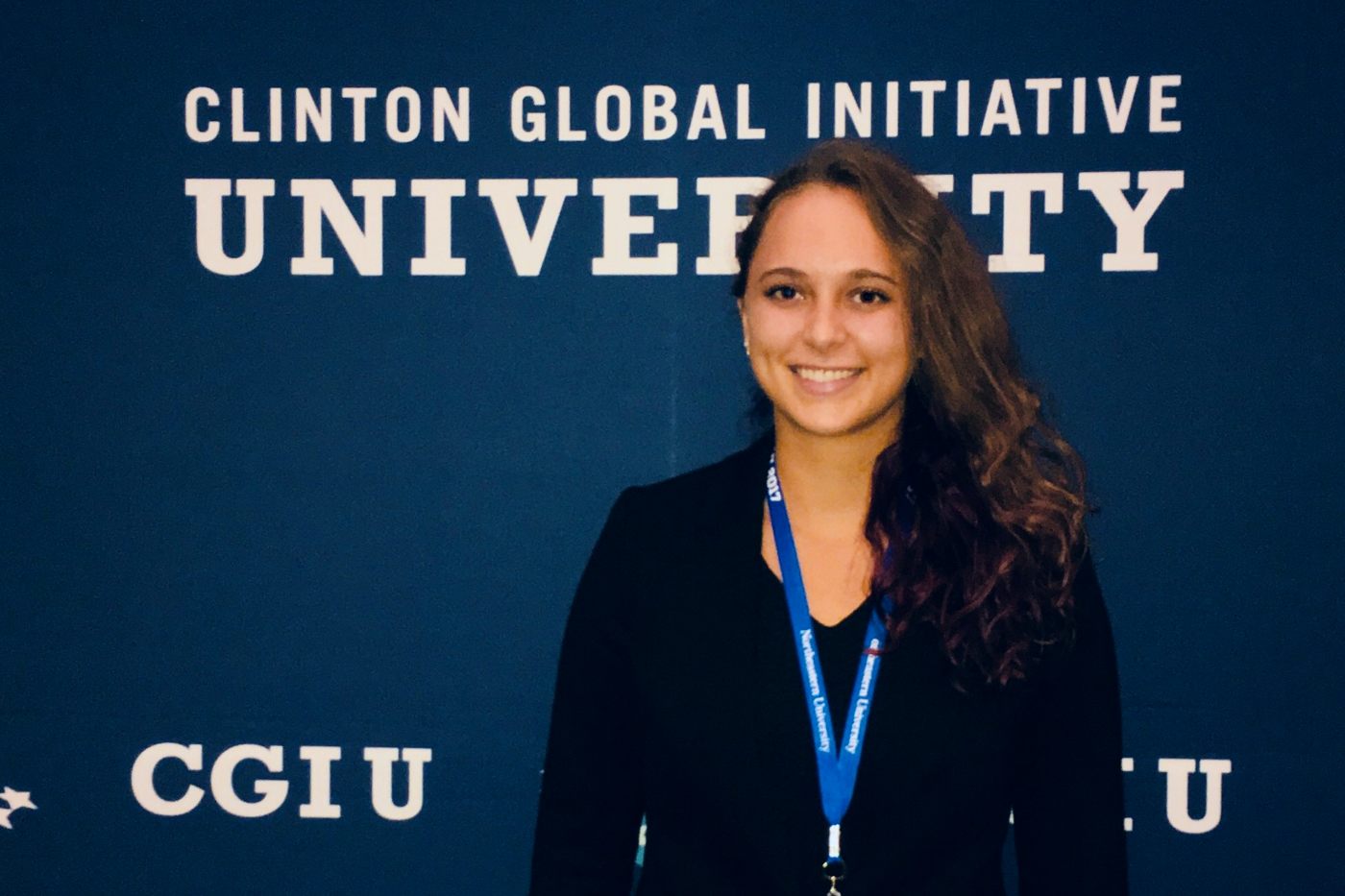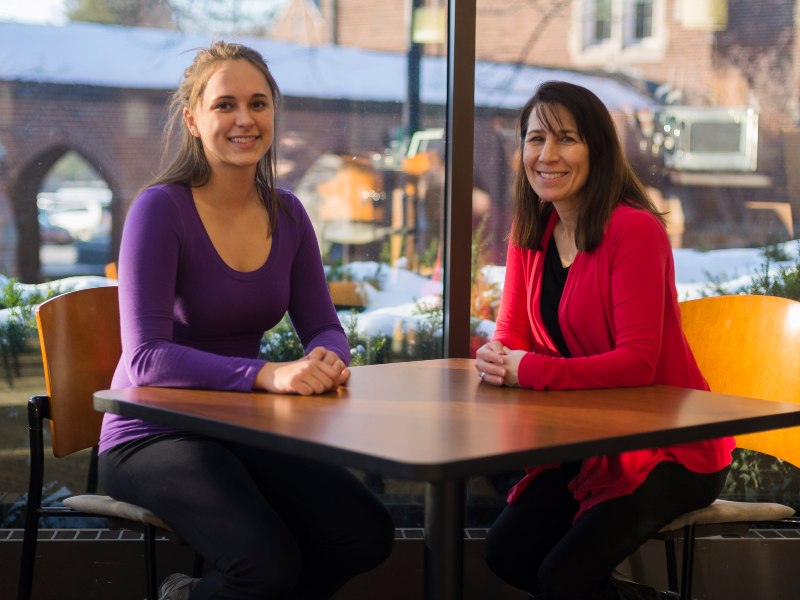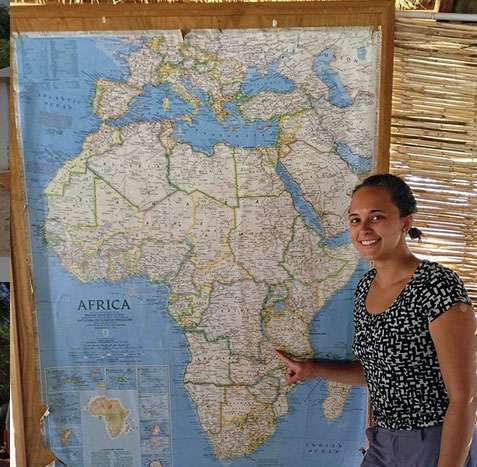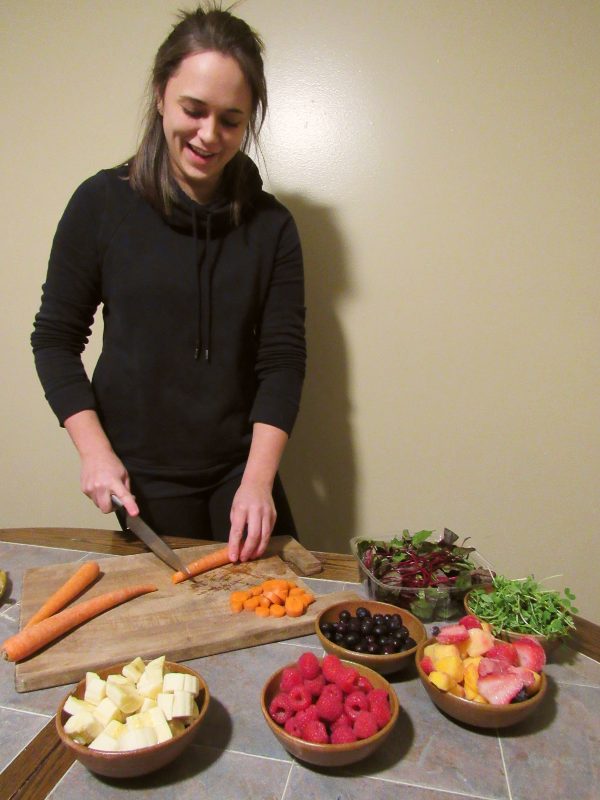Researching Racial Disparities, Testing Healthy Smoothies, and Learning in Jamaica
Aubrey Baldauf had transformational experiences in college — and then headed to the Peace Corps to promote health in Zambia.

Aubrey Baldauf '19 became a social work major because she wants to advance social justice, human rights, and help people improve their well-being. In college, she repeatedly jumped at opportunities to make a difference for others and to advance her learning.
"I wanted to become engaged, and there are opportunities at every turn," says Baldauf, including locally and overseas. Her involvement:
- For her honors program thesis, she researched how income, housing, food, and structural and interpersonal racism contribute to racial health disparities — and what can be done. Her in-depth honors project “was a reason to push myself, to learn more, to become more confident in the field I want to go into. It was a self-driven learning project, that I’d never done before. I had to set my own due dates. It also helped me understand how to do research. I have a feeling it’s going to help me a lot in the future — both the practical information and the skills I learned.”
- When a professor invited students to help at a community meal program, she became a weekly volunteer. She grew up in the middle-class, mostly-white town of Queensbury, NY, a suburb about an hour outside Albany and says she wasn’t familiar with cities. She’s been impressed with Rochester’s network of organizations to serve people.
- Her proposal for an innovative solution to a pressing global challenge was selected by an international conference — earning her a trip to attend the workshops, speakers, and networking opportunities in Boston. Her project explored a way to provide healthier food options to people dealing with housing or financial insecurity. She then presented about her experience at Nazareth. She says the conference was a great place to learn how other students were putting their own spin on ideas to make a difference in society.
- She joined Nazareth’s social work service trip to Jamaica, where a dozen Nazareth students served and learned at schools, hospitals, service agencies, and a home for elders; saw how social services are carried out in Jamaica; and heard evening lectures about policies and history that provided context. “It was a really cool way to learn a lot really fast.” Bonus: “We were all really good friends at the end of the trip."
- She interned for a semester with Metro Justice and with the Sisters of St. Joseph, seeing different approaches to promoting change.
- She pursued advanced work in her field practicum at Person Centered Housing Options, a local non-profit serving the homeless community.
In her senior year, Baldauf won her third president’s civic engagement award at Nazareth, recognizing “outstanding commitment to service.”
Meanwhile, Nazareth's campus-wide engagement in the broader community earned Nazareth national recognition recently from Washington Monthly. Out of 695 colleges, the magazine ranked Nazareth 4th in service for “encouraging students to give something back to their country,” 5th in voting engagement, and 6th for the percentage of students doing community service through federal work-study.

"She's been there for me every step of the way," says Aubrey Baldauf (left) of Prof. Leanne Wood, LMSW, Ph.D., director of the social work undergraduate program. Wood helped Baldauf apply for the Peace Corps and, with others in the Social Work Department, helped Baldauf get all of her internships. Bauldauf wasn't interested in research until taking a research class with Wood.
In an interview, Baldauf reflected on what she’s learned from her academic and service experiences:
How did you think of social work?
Baldauf is a talented bass player and was first drawn to Nazareth to study music therapy. But in her first year of college, she felt pulled to affect people's health and well-being more broadly, which led her to social work.
"I was more drawn to how where you live, and who you see, and what you eat — macro aspects — affect a person's life," Baldauf says. "My social work professor gave me a clue that social work focused on social justice and human rights."
Baldauf was also able to continue playing music at Nazareth.
Individuals are the expert on their life
"You can only know so much and your influence is limited," Baldauf says. "You can listen to them. You can offer suggestions, but they can say no. Just because you have a degree doesn't mean you understand what they're going through."
When she offered multiple hands-on smoothie-making sessions to local community groups, she took a wide variety of ingredients and mentioned ideas such as trying spinach — rather than telling people they should eat spinach. "I talk about how easy it is to hide your veggies in smoothies," she says. She returned to each location a half dozen times.
"I love asking people what they want me to bring (next time) because it's super revealing about their lives," she notes. "Your life affects what you eat and what you eat affects your life."
Be persistent to pursue your interests
The smoothie project grew out of her experiences volunteering monthly for several years during college at Asbury Caring and Dining Center in Rochester. She saw the challenge of providing vegetables and fruits in ways that guests would eat them. She thought light-hearted smoothie-making sessions might be a more successful strategy to provide and encourage healthier food options.
Making a smoothie, she says, "is super easy and it's concentrated with nutrients." She adds, "A lot of people would say I didn't know you could put that in a smoothie. That's a win to me. And people taught me cool smoothie combinations! It was a two-way street."
Baldauf had to work through various challenges and had support from Nazareth's Center for Civic Engagement. One community agency staff member "kind of laughed at me. I had to push." After she got another group on board, she circled back to the reluctant staffer. Baldauf eventually convinced four local service providers to allow her to offer smoothie sessions and conduct surveys at their locations, and she successfully carried out the project at multiple sites over nine months, including a homeless shelter, a post-incarceration program, and a group for people who'd recently lacked permanent housing. At times, her roommate, Brigid Redihan-Henehan '19 — a nursing major — joined her to check people's blood pressure and to talk about body mass index and diabetes. Baldauf said she gained experience working with people whom social workers likely interact with.
For her 20th birthday, she asked for blenders. At the end of her project, participants at each site won a blender. One woman who'd been incarcerated and was just finding housing told her the blender would be the first appliance in her home and that she'd use it every day.
Her advice for other students
"I think it's so important to go into places you're uncomfortable." When she approached organizations about her smoothie project, or when she went to community meetings for her internship related to homelessness, she didn't know what she was doing. "Doing things that aren't comfortable to you is what makes you grow as a person."
Example: "I'd never presented a budget in my life. I've learned a lot."
By her junior year, as an intern with Sisters of St. Joseph, she helped interview people in Rochester's Lyell-Otis neighborhood for a community needs assessment. She also went to a prison and attended a men's religious group. "Take an interest in government and in your community. Almost any agency would let you shadow or volunteer for a day and you'll learn more than you can imagine."

Peace Corps
After graduation, Aubrey headed to the Northern Province in Zambia for 2 years in the Peace Corps.
Update
- Baldauf went on to earn her master's degree in social work from SUNY Brockport
- Baldauf became a forensic intervention specialist for Monroe County's Office of Mental Health Forensic Intervention Team, New York

Aubrey prepping ingredients for her community smoothie project